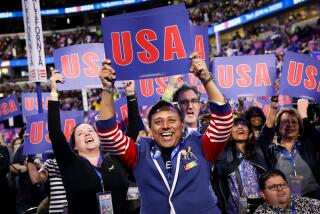A Diverse Crowd Will Get Cameos on the GOP Stage
PHILADELPHIA â Usually itâs Democrats who make a big deal out of racial, ethnic and religious diversity. They support affirmative action. They guarantee every group a visible place in party affairs. Bill Clinton even promised a Cabinet and staff âthat look like America.â
Republicans usually recoil from such calculated displays.
But not here, not for the televised face of a Republican National Convention designed to help catapult Texas Gov. George W. Bush and his running mate, former Defense Secretary Dick Cheney, into the White House. A master-work of visual spin, this convention is designed to look like the political equivalent of a poster for Brotherhood Week.
African Americans who survived the projects. Women crusading for good causes. Welfare mothers with new careers. Minority children with amazing talents. Asian Americans who have become national leaders. Even a blind mountain climber who plans to scale Mt. Everest.
And Latinos, lots of Latinos--a group Bush has particularly high hopes of reaching.
In effect, the convention will be a four-day campaign commercial, with emphasis on the kinds of âAmerican heroesâ President Reagan once used for political drama.
Scholars say the focus on image-making is both smart politics and an almost-inevitable response to the changing habits of American voters.
âPeople have no patience to sit through political oratory these days,â says Charles Atkin, a specialist in political communications at Michigan State University. When it comes to the convention, âyou might as well present it as strictly a television program.â
Except for the acceptance speeches by Cheney on Wednesday and Bush on Thursday, most of those scheduled to appear during prime time have been carefully chosen to appeal to groups with which Republicans sometimes have problems and to project the more open brand of âcompassionate conservatismâ that Bush espouses.
âItâs wise on the partyâs part,â says John Anderson, a specialist in political media at Holy Cross College. âIn a sense, they are trying to package the party, saying . . . âWe are more diverse and open than you might have thought. Stay tuned.â â
Though analysts doubt such efforts will influence large numbers of voters, even small effects on the margin could be valuable in a close election.
In times past, the cameo roles at national conventions were doled out to governors, senators, future stars and party factotums. Now, with television replacing party organizations as the primary means of reaching voters, that is changing.
âA few years ago we were in a transition period and viewers were turning off their television sets,â Anderson says. Now, he says, âthe parties have come to see an opportunity.â
The resulting exercise in image-making is reflected in the appearance this week of people such as Erik Weihenmayer, who is scheduled to deliver the pledge of allegiance when the convention opens tonight.
Weihenmayer lost his sight while a teenager but has still managed to skydive, ride a mountain bike, run marathons and climb mountains, including El Capitan and the highest peaks on three continents.
Another opening-night speaker is Paul C. Harris, an African American who holds the Virginia Assembly seat once held by Thomas Jefferson--usually a hero of the Democratic Party. Raised by a single, teenage mother, Harris grew up in drug-infested public housing. But he won a college scholarship, became a paratrooper and earned a law degree before going into politics three years ago.
Though Harris is not a convention delegate, the GOP invited him to speak because he âpersonifies the qualitiesâ being focused on, a party spokesman said.
Ten-year-old Mari Griego, chosen Child Artist of the Year by the New Mexico Hispanic Assn. in 1998, will sing the national anthem tonight.
Other featured Latinos include Joe Guerra, a small-business owner with eight children; Pilar Gomez, who trains parents to help their kids do better in school; Everett Alvarez, the first U.S. pilot shot down over Vietnam; and Raul Fernandez, founder of a thriving dot-com company.
Elaine L. Chao, an Asian American policy analyst who formerly headed the Peace Corps and United Way, will speak on immigration. And rabbis seemingly outnumber Protestant clergy, despite the prominence of the Christian Right in the GOP.
To punch up other campaign themes, the convention will showcase representatives of charter schools and faith-based service organizations. Retired Army Gen. Norman Schwarzkopf, commander of Operation Desert Storm, will speak by satellite from the battleship New Jersey.
Nancy Brinker, a breast cancer crusader, is considered an especially appealing figure for female viewers, and the GOP has sometimes struggled with a gender gap.
âIf you look at womenâs priorities in polls, health shows much higher than for men. She would be the perfect type of person to put on stage during prime time,â Michigan Stateâs Atkin says.
One thing all these faces will not do is reflect the predominantly white, disproportionately male, and relatively well-educated and affluent GOP delegates spread out before them.
Of course, delegates are always above average and different from voters as a whole, though Democratic Party rules require gender balance and have provisions assuring minority representation, while the GOP does not.
The party also will make a pitch for so-called Reagan Democrats, the predominantly blue-collar white male voters who deserted the Democrats for the Great Communicator. World Wrestling Federation star The Rock, NFL legend Steve Young, country singer Hank Williams Jr. and Lee Greenwood, known for his song âProud to Be an American,â will make appearances.
And, lest any viewer think Republicans are not cool, there will be Chaka Khan, Harold Melvinâs Blue Notes, Cuban-born R&B; artist Jon Secada and Regular Joe, a rock band featuring Rep. Joe Scarborough of Florida.
Not to mention hip Philadelphiaâs favorite rock group, the Delfonics.
More to Read
Get the L.A. Times Politics newsletter
Deeply reported insights into legislation, politics and policy from Sacramento, Washington and beyond. In your inbox three times per week.
You may occasionally receive promotional content from the Los Angeles Times.










